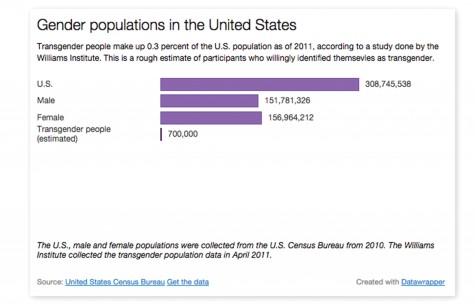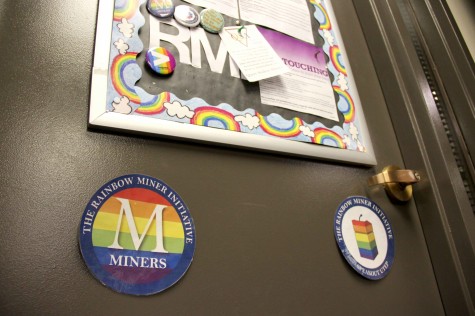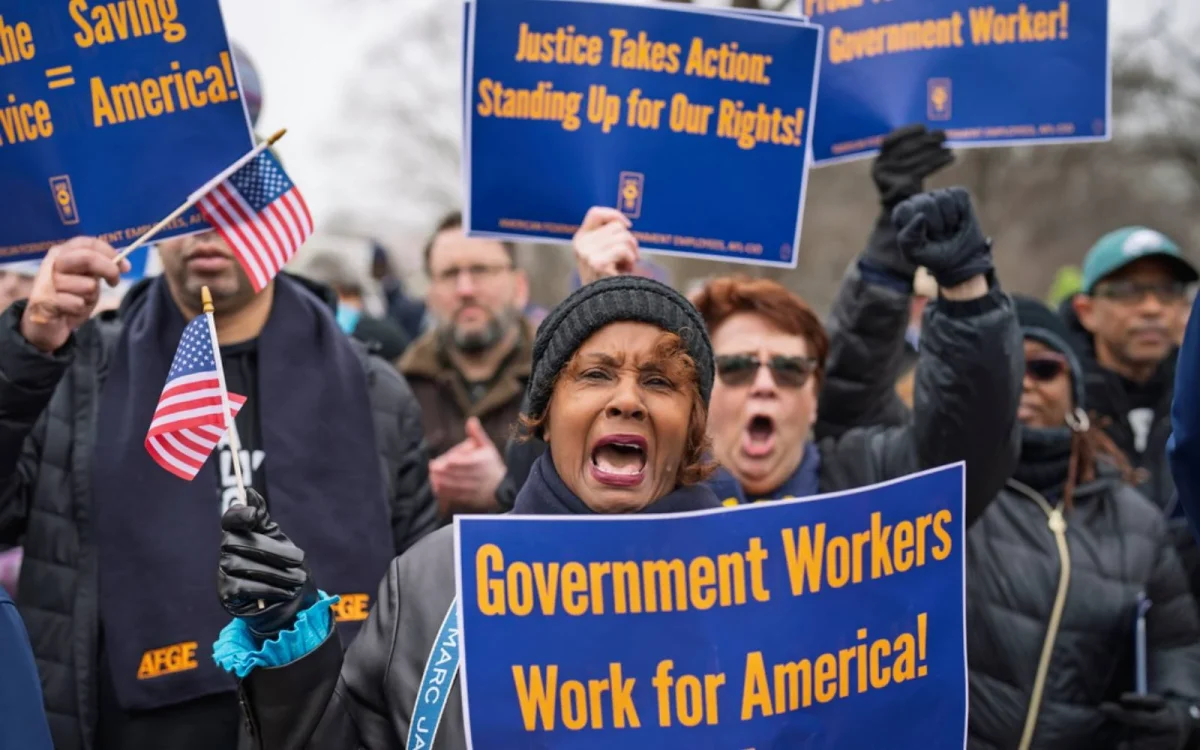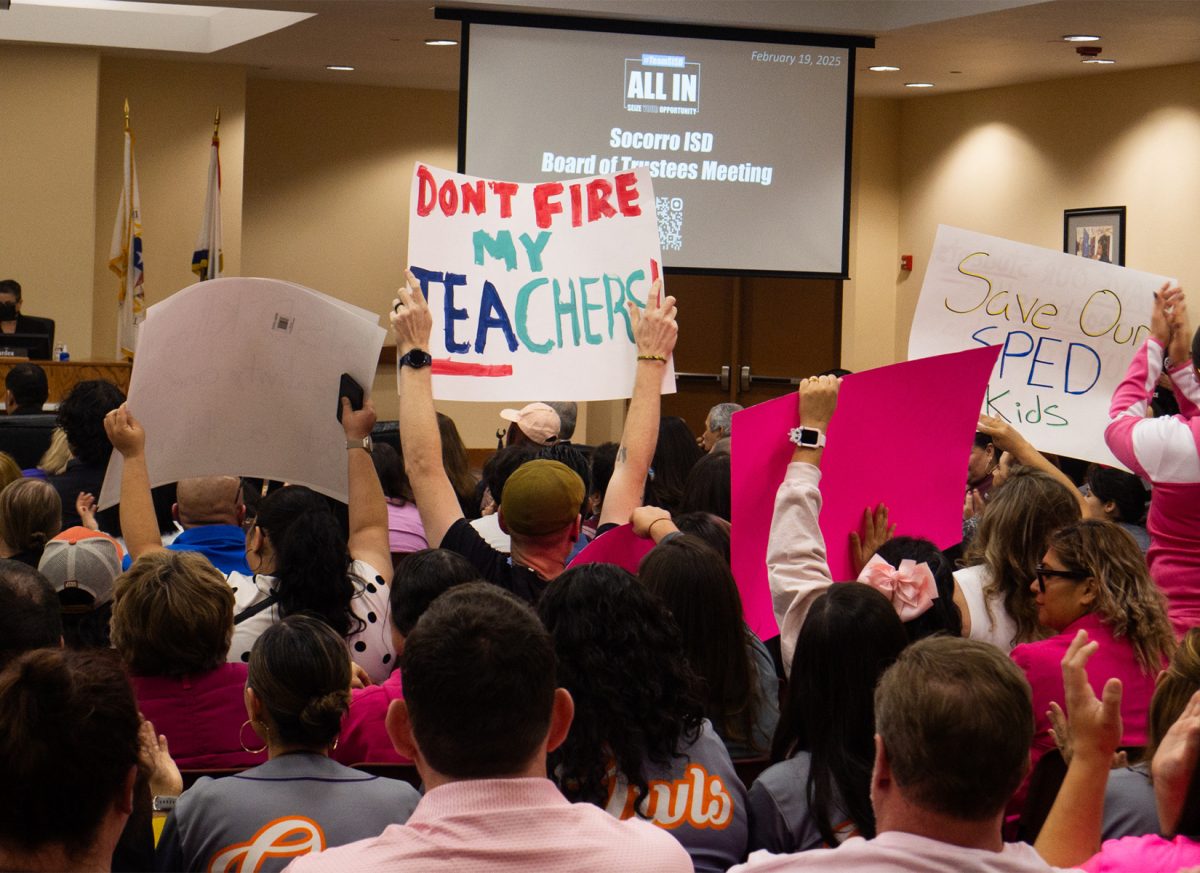 This is part two of a two-part long-form series, which will be available at theprospectordaily.com.
This is part two of a two-part long-form series, which will be available at theprospectordaily.com.
Read part one here.
There are more than 320 billion people in the U.S. to date, but there are limited estimates as to how many of those individuals in the country are transgender.
Few surveys and research studies have been released that attempt to assess the transgender population.
One study by the Williams Institute, a law school in Los Angeles, was released in April 2011, and it said that there were about 0.3 percent of adults in the country who identified as transgender. The information was collected from surveys that asked about sexual orientation and gender identity questions.
However, this is a rough estimate—about 700,000 transgender people were willing to answer these questions on the survey.
Those who did not answer may still be afraid of identifying themselves to the public.
“The problem is we don’t have data. Currently, there are only two health-related reports in the entire nation that collect LGBT status. We don’t know what the size of the transgender population is in this country because we don’t collect gender data properly,” said Dr. Oralia Loza, assistant professor of public health sciences. “We don’t know what their needs are, we don’t know what their other health risks are. We only hear about their health risks that are involved with things like HIV, depression, suicide, murder and other very negative health outcomes.”
The U.S. Census Bureau and the Centers for Disease Control and Prevention do not have transgender or a third gender as an option.
Loza said that when it comes to general health, not much is known about transgender people because medical records don’t include a proper assessment of gender.
“We don’t know about education levels because universities don’t collect that. We don’t know criminal history because the police and different agencies don’t collect gender,” she said. “ When you don’t have an option for something other than male or female, basically you have an invisible population. So you don’t know anything about them—you don’t know what their needs are and how to meet them because they don’t exist on paper.”
Loza has attended conferences on transgender health, where she finds out what is happening in other parts of the world and how the laws are different or how other countries cover health needs or services for transgender people—what the differences are and how they make it happen.
“There are groups who want to make health care more accessible to vulnerable populations,” she said. “I’m working with people who make that happen, at least locally.”
Loza also works with student organizations on campus to bring awareness to the issue of transgender health.
She has spoken at the Queer Leadership Conference and participated in Queernival. She invites her students to the events that are hosted at UTEP that revolve around LGBTQA issues. She is also the advisor for the Students for Public Health, and tries to involve her students in that way as well, such as supporting Transgender Remembrance Day.
“I tell my students about these events, and they may not always go, but the fact that I’m bringing it up and saying that it’s here on campus, brings awareness. I bring up examples in my class and I talk about data,” Loza said. “I teach statistics, so I talk about the limitations of most data sets that include male-female–sex is called gender or gender as sex and how that’s a mistake, but it’s all we have.”
With the help of Loza and the professional network she is a part of, resources in El Paso will continue to be identified, helping those in the community who are transgender find the health care they need without leaving the city, along with collecting data on this population.
“I think El Paso is really open to embracing and learning how to embrace the LGBT population,” Loza said. “It’s a difficult transition because there are other things involved—like cultural practices or beliefs toward LGBT—so there’s a lot of factors, it’s not simple.”
Being LGBTQA at UTEP, in El Paso
Adriano Kristian Perez, senior biology major, is a transgender male.
He currently works for the Texas Freedom Network, a non-profit organization that focuses on reproductive health issues and LGBTQA equality.

“The ‘T’ is my focus, since I’m transgender, and it’s often the ignored part,” Perez said. “I’ve always volunteered for things like that, but I never thought I could make a career out of it, and then I realized that I could so I did. That’s where my heart really is.”
He receives his hormone treatments in Las Cruces, N.M., commuting there and back. The next step would be a hysterectomy. Since he is on testosterone, his uterus is not cleaning itself out each month.
“I could still be ovulating, so that means shit’s just building up in there,” Perez said. “I’m supposed to do that within the next four years so it doesn’t cause any major complications.”
After this step would be bottom surgery–the addition or removal of genitalia.
“I don’t want to. I don’t think the genitals are specifically gendered anymore. I don’t think one gender has one specific set of genitals,” Perez said. “Some people need that because they’re uncomfortable with their vagina, but I’m not uncomfortable with that part of my body and I don’t think it makes me any less of a man.”
Bottom surgery for transgender people is about $50,000 if they have a letter of approval from a willing physician, and may require recuperation for three months.
Transgender people can also change their gender identifier on their ID cards, which costs about $3,000 in Texas.
Corey Bailey, director of the Student Engagement and Leadership Center, said that through the Rainbow Miner Initiative, LGBTQA students on campus go out to classrooms and have panels to talk about their experiences at UTEP and in the community.
“RMI is majority programming, but then there is a consultation component. Interns in this area have a private suite,” Bailey said. “We want students who are going through these experiences to be comfortable to talk to these interns, who can point to other organizations on campus and in the community.”
RMI provides a space for students to talk, to get support to continue to move through their experience.
“They can point to a queer student alliance, and those students who are coming in can find a community that way,” Bailey said.
Bailey said the Speak Out series is another way the university is reaching out to the community. Professors reach out to SELC in order to offer these panels every fall semester, usually to the university classes.
Another outreach effort is Queernival, an event hosted by SELC, which usually features a drag show from an outside agency.
“Hopefully, if transgender students do attend this, it gives them a sense of pride and gives the issue light,” Bailey said. “We are celebrating their identity.”
Bailey also said that the Women’s Studies Program is another resource for LGBTQA students, particularly transgender students.
“They are definitely strong advocates,” Bailey said. “We also have stickers that have ‘ally’ on them and we’re rethinking how we bring that back to life, to put up these symbols. In essence, they serve as resources too, because students know who their allies are and can approach those faculty members.”
Although he feels safe in El Paso, Perez said it is more about tolerance than acceptance for transgender people. Yet, on campus, he said students and professors alike are accepting toward the transgender community.
“One semester, after I had picked my name and hadn’t legally changed it yet, I emailed all of my professors to not call me by my birth name and to change my name on the roster, to let me write my name on my papers, even though that wasn’t the name on my file,” Perez said. “They were all cool with it, even the older white men, who are scientists and just care about their lizards and ants.”
Perez also received a scholarship with the College of Education.
“They know I’m trans. I’m like, ‘you do know, no one is going to hire me because I’m trans, but thank you for giving me all of this money to become a teacher,’” Perez said.

Perez said he has been trying to implement gender-neutral bathrooms on campus.
“When I first started hormones, I was just going to the female bathroom. But for a while between my transition, I wasn’t quite passing as a male, and I was very clearly not read as a female,” he said. “So, I didn’t know what to do for the longest time. I go into the men’s bathroom now—after my voice completely dropped and my body was clearly read as male.”
Bailey said there were some discussions about gender-neutral options such as bathrooms on campus.
“How far those discussions went, I’m not sure,” he said.
A staff member was in the process of transitioning and went to Bailey to ask for advice on resources.
“I’m not sure if she is still at the university, but the discussion of gender-neutral options was looked at, but never solved,” Bailey said.
Perez said that changing your name with records should also be tied to changing your name in the Blackboard system.
“It makes things hard. That is a female name and I’m not that person, and they don’t believe me when I show them my ID and I’m standing in front of them,” Perez said. “They get confused and think the system’s broken. No, that’s me, just give me my paper.”
As his treatments started to change his voice and physique, Perez said that he passes better as a man.
“I don’t get discriminated against as much. When trans women transition, there are still features there that could give them away that they are trans,” Perez said. “It’s dangerous, that opens them up to violence and discrimination in general.
He said that trans men tend to be more privileged than trans women, and since he is transitioning from a position of oppressed to one of power, he has been given male privilege and benefits from many things.
“People take me more seriously, but then when they find out I’m trans, they take me less seriously. That’s not okay,” Perez said. “Trans men, in general, are sometimes really awful because they’ll transition into a position of privilege and not acknowledge that power dynamic, and not acknowledge where they came from. It’s frustrating; trans men tend to be terrible misogynists.”
Since education is Perez’s minor, he said he wants to understand the education system and help the field since he said things are harder in Texas.
He said he wants to continue working for non-profit organizations and being a transgender person in that field is not a problem.
Perez recently traveled to Austin with the Texas Freedom Network to rally outside the capitol in support of women’s health rights.
“In high school and when I first started here, I always felt overwhelmed about the conditions of things like ‘I need to fix the world,’” Perez said. “There’s just a lot of injustice that happens in the world in many aspects, and I want to help where I can.”
Lorain Ambrocio may be reached at [email protected].




